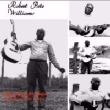|
|

Robert Pete Williams No photos of Geechie Wiley, the wavering voice of "Last Kind Word Blues", none of Ragtime Henry Thomas, oft considered the link to pre-twentieth century blues. Only one photo of Blind Willie Johnson, Robert Johnson and Charley Patton. From such frail roots of personal paraphernalia sprouts all our rock. How did such strands run through the heavy ore of impoverished minor history, or the blizzards of dust blown by modern times and centralized entertainment, buffed free of all callousness of locale and community, to get to us today? Such icons, which is what revisited history makes of these performers, entertainers, nearly lost to us for all time; how do their roots grow tumescent with each generational re-unearthing, that jelly-roll stirring awake beneath the covers so as to love once again? Drag the needle through the mud, let it crackle, dry up and fissure, the blues dribbling nectar, the juice of a lemon, down the throat. For those who don't have a single bead of sweat to run down the back of the sun-parched necks, where the laser must drag instead, through the shine of disc instead, let quench come from where it may, through pond water or blood drips. Let's drink to the salt of the earth. To the person of Robert Pete Williams, and remember him by any means we can, for he, for all his girth and slow aching walk, slips further and further away with each end of day, in the evening. Fat Possum has dug up this latter-day record originally pressed up in 1971 by Ahura Mazda Records, adding the "Goodbye Slim Harpo" single to boot. But even in the new present, Robert Pete's still eyeing that long length of train, the Southern Pacific rumbling past, running to the distance, both ends of the train seem to be running from this farm to the horizon, rambling on his mind. Four photos of him here, in front of the farmhouse fence posts in rural Louisiana. The guitar wood aloft in his monstrous hands, as if it could resound over the entire field. More farm pics on the back, some pigs in the pen. They are here, snorting, and the chickens as well, scratching just below the surface, burying some seeds and sprouts, devouring the most obvious. Hear how the cock crows throughout the spaces of the first song, "Farm Blues." There is passing highway breath as well, the rumble of interstate trucks through the countryside. Never are such natural sounds a diversion or obtrusive here. Rather it is as if Robert Pete Williams is imbibing the passing winds with the blues, so that they might breathe back into each piece. "I hear the echo in the atmosphere, kind of moanin' and hummin' like. I can come back and take my guitar and I can put those blues together and pick 'em." While one of the few true improvising bluesmen able to compose an almost non-linear structure and coalesce the surroundings into stark words and lines, Williams is also an anomaly in the world of blues, separated from all notions of locale and geography. He's not Southern blues, nor Texas Rural, or country blues. If anything by land mass, something closer in kin to South African, the voicings bizarre in the Western world, the way the rhythms gather and disperse across the strings. Here he presents some of his individual electric slide work as well, as slippery and sloppy as can be, perfect for the more ribald songs like the perfectly titled, "You Used to be a Sweet Cover Shaker But You Ain't No More." Even when he imbibes a blues cliché like Bessie Smith's old matchbox-space meditation, Williams mutates the line as it rolls along the tongue and out into the air, as it rolls further away, and the bellowing approach of the train is a natural element at the song's end. With every pass of the rattle, each steam engine whispers an unfulfilled promise of escape. There is wandering restless under each phrase and breath, a drifting across the tracks, walking towards a sweet and final dissipation. Promise must lie in the trains mostly, dissolving at a distance, the strings spacing apart, sliding away, and leaving plenty of room for injunctions, chugs of bass strings, high-picked notes growing wild as weeds along the side of the road. But since there is no leaving for Williams, he instead ties the farm in with his guitar as fencepost. Brays and clucks, barb wire pluckings, quivering in the desolate winds, horse clops and shivers, cow cud chews, slow and casual they move with the guitar. Between the wires are the sounds of the barn creaking, the wind kicking dust, locusts aflutter, fly-buzz too, all in ever-stirring, unshapeable patterns, scarcely speakable. Yet combined with the weary passions of this quiet man, his mouth and hands merely opening to vent, this intake of breath draws the whole world of Mavingouin, LA, into his lungs, and we can hear how it all comes out, raspy yet gentle. More telling than a picture could ever be. Copyright © 2002 Andy Beta
|
| © 2011 Luna Kafé |